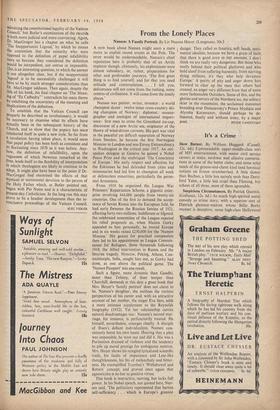From the Lonely Places
Nansen: A Family Portrait. By Liv Nansen Hoyer. (Longmans, 30s.)
A NEW book about Nansen might seem a mere move to exploit recent events at the Pole. The error would be understandable. Nansen's chief reputation here is probably that of an Arctic explorer though, ultimately, his explorations were almost subsidiary, or, rather, preparations for other and profounder journeys. 'The first great thing is to find yourself, and for that you need solitude and contemplation. . . . I tell you, deliverance will not come from the rushing, noisy centres of civilisation. It will come from the lonely places.'
Nansen was painter, writer, inventor : a world champion skater : twelve times cross-country ski- ing champion of Norway : diplomat : oceano- grapher and zoologist of international import- ance: first man to cross the Greenland ice-cap, discoverer of a new Arctic sea, originator of the theory of wind-driven currents. His part was vital in the peaceful yet difficult separation of Norway from Sweden; he became the first Norwegian Minister to London and was Envoy Extraordinary to Washington in the critical year 1917. An out- spoken delegate at Geneva he gained a Nobel Peace Prize and the soubriquet 'The Conscience of Europe.' His early respect and affection for the Eskimoes he had defended from cities and missionaries had led him to champion all weak or defenceless minorities, particularly the peren- nial Armenians.
From 1919 he organised the League War Prisoners' Repatriation Scheme, a gigantic enter- prise involving 444,000 people from twenty-six countries. One of the first to demand the accep- tance of Soviet Russia into the European fold, he had early foreseen the Russian famine of 1921, affecting forty-two millions. Indifferent or bigoted, the celebrated nonentities of the League rejected his relief proposals so, when Maxim Gorky appealed' to him personally, he toured Europe and in six weeks raised £250,000 for the `Nansen Mission.' His genius for practical compassion then led to his appointment as League Commis- sioner for Refugees, those thousands following 1918, the Allied intervention in Russia and the Smyrna tragedy. Moscow, Peking, Athens, Con- stantinople, Sofia, sought him out, as Gorky had done, as one above the political game. The 'Nansen Passport' was one result.
Such a figure, more dynamic than Gandhi, saner than Tolstoy, of finer temper than Churchill, demands at this date a great book that Mrs. Hoyer's 'family portrait' does not claim to be. Nansen's daughter, she outlines the various perspectives of his career and, with an attractive account of her mother, the singer Eva Sars, adds a more intimate supplement to the Reynolds biography (1932). Yet her relationship carries natural disadvantages too : Nansen's second mar- riage, for instance, is perfunctorily treated. He himself, nevertheless, emerges clearly. A disciple of lbsen's defiant individualism, Nansen con- sistently burnt his own boats. Hearing that a plan was impossible, he went out and did it. His was a Puritanism drained of violence and the tendency to pile up moral prestige for ambiguous motives. Mrs. Hoyer shows his mingled lyrical and scientific traits, his faults of impatience and Lear-like thoughtlessness, his fits of melancholy and bitter- ness. He exemplified Toynbee's 'Withdrawal and Return' concept, and proved once again that agnosticigm is no bar to positive virtue. This book is instructive, moving, but lacks full power. In his Nobel speech, not quoted here, Nan- sen said, 'The politicians represented that barren self-sufficiency . . . which is Europe's greatest danger. They called us fanatics, soft heads, senti- mental idealists, because we have a grain of faith that there is good even in our enemies. I don't think we are really very dangerous. But those who ossify behind their political platforms and who hold aloof from suffering humanity, from starving dying millions, it's they who help devastate Europe.' A purity of pity and anger drove him forward to clear up the mess that others had created, an anger very different from that of some more fashionable Outsiders. Some'of this, and the glories and terrors of the Northern ice, the solitary skier in the mountains, the acclaimed statesman brooding over Dostoievsky's Prince Myshkin and Alyosha Karamazov, should perhaps be de- lineated, finally and without irony, by a major






























 Previous page
Previous page